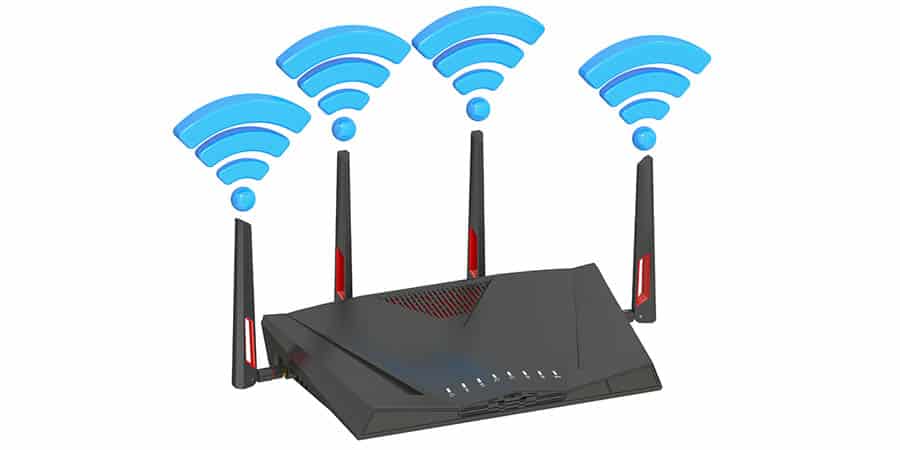Sometimes, the words used to describe a router or wifi network can be pretty confusing. Between Wifi 6, LAN ports and mesh systems, it’s not always easy to know what’s what, and it’s no wonder that people are left bewildered.
One thing that you’ll see a lot if you’re looking for a new router is dual band. In 2021, it’s pretty much expected that your router is going to be a dual band model. They’re now the new norm, and there’s definitely an advantage in having an extra Wi-fi band.
And in some cases, it may even be worth thinking about going for a tri-band router too. But what circumstances and reasons would justify opting for a tri-band router, and how exactly do they work?
Dual-band vs Tri-band routers
Okay, so the main difference between a tri-band and a dual-band router is that a tri-band router simply has an extra 5.0 GHz band for you to use. Check here if you aren’t clear on the two wifi bands.
With a dual-band router, you have the 2.4 GHz band and the 5.0 GHz band to connect to. With a tri-band router, you have two 5.0 GHz bands to use, along with the 2.4 GHz band.
The most common confusion is that there’s a new band at a different frequency for you to use. This isn’t the case, and you simply just get one extra band to use instead.
Your devices are intelligent enough to automatically connect to the correct wifi band. If you’re an Android user, you’ll probably notice that your device connects to the 2.4 GHz band. An iPhone will likely connect to the 5.0 GHz if the network isn’t congested.
This is simply just because an Android phone is more likely to favour range over speed. The 2.4 GHz band is more reliable and better at distances away from your router. In comparison to this, the 5.0 GHz band does allow for a faster connection, but it doesn’t travel through walls as well.
Either way, your device should connect to the best band possible. You can also do this manually in your router settings if you want to as well, as most of them will allow you to split the bands out individually. But for the most part, your phone or device should connect automatically to the best one available.
Do I need a tri-band router?

So, you may be thinking about getting a tri-band router. Whether that’s advice you’ve received or something you’ve read online, they are definitely becoming more and more popular.
The truth is though that most people don’t really need a tri-band router. Two bands should be more than enough for the vast majority of us out there to use in our homes.
The thing is that at home currently, I’m using a dual-band router. On that router, we’ve got one Xbox playing, someone streaming a film in 4K, and one person using a laptop.
These are the only things that are actively using the wifi connection. You don’t need to be too worried about the amount of device connected – you could have 20 devices connected, but if you’re only actively using 3, that’s all that matters.
Anyway, back to the Xbox, laptop and TV streaming. These are all connected to the one 5.0 GHz wifi band on the router (it’s a hub, actually). They all work fine together, and the hub or router will automatically connect you to the wifi band that gives the best connection.
So what I’m saying is that if you just have a few devices like this working at the same time, then you don’t need a tri band router at all. They’ll all be able to share the bandwidth equally between them, and you’d probably get better results upgrading your internet package.
Scenarios where tri-band makes sense

But, there are some circumstances where it would make sense to opt for an extra wifi band to use.
The main one that I can think of is if you have multiple people gaming within the same household. Gaming can use a lot of bandwidth, and in this scenario, having two separate wifi bands to connect up t0 could prove useful.
A tri-band router can stop the two or more gaming consoles from interfering with each other. So, they could be very useful in a houseshare, or if you’re in an home with 10+ people, then yes – a tri-band router is definitely worth investing in.
Another scenario where tri-band Wi-fi may prove to be a good investment is in an office scenario. If you have a lot of people in the same building all using the network, then it can definitely put a strain on your internet connection. Having that extra band will definitely come in handy.
But for most people, it’s not worth it. Though you may be convinced into buying a tri band router to improve the connection of the two phones in your household, this won’t help.
Conclusion
In conclusion, having a tri-band router can be useful. Having that extra band, which is often used as a backhaul band for a stronger connection, can be great if there’s a lot of devices on the network. Small offices and those sharing a house with a lot of other people may want to think about getting a tri-band router.
But for the most part, a dual band router will be enough. Your wifi router is smart enough to run several devices at the same time. The quality of your connection is more dependent on other factors, like your bandwidth, than it is on having to share a band with another device.